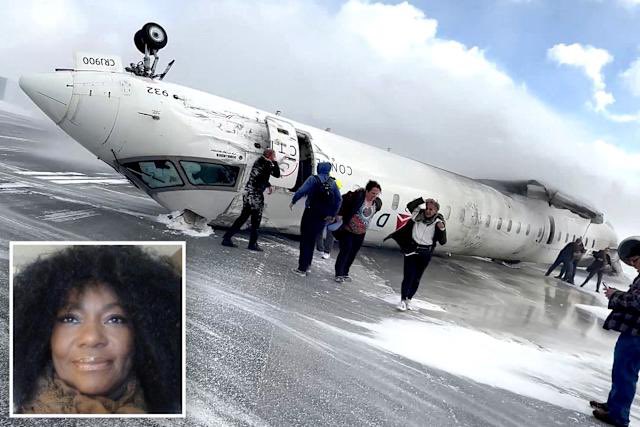
A Detroit woman has filed a $75 million lawsuit against Delta Airlines following a terrifying plane crash in Toronto that resulted in the aircraft flipping upside down. The incident has left the survivor grappling with not only physical injuries but also the lasting psychological impact of what was undoubtedly a life-threatening ordeal.
The crash occurred during the plane’s approach to Toronto’s Pearson International Airport. According to eyewitness accounts and preliminary investigations, adverse weather conditions combined with technical issues led to the aircraft losing control and overturning upon landing. Passengers on board experienced a harrowing ordeal as the plane skidded off the runway and came to rest upside down, a scenario that could have easily resulted in catastrophic loss of life.
The Detroit woman, whose identity has been kept private for legal and personal reasons, was among those on the flight. Despite the chaos, she managed to survive the crash but sustained multiple injuries. In the aftermath, she has reportedly been undergoing extensive medical treatment and therapy to cope with the trauma and physical consequences of the accident. Beyond her personal suffering, she alleges that Delta Airlines failed to take adequate safety precautions and provide necessary assistance before, during, and after the incident.
Her lawsuit claims negligence on the part of Delta Airlines, asserting that the airline did not maintain proper safety standards or sufficiently train its crew to handle such emergency situations. She is seeking $75 million in damages to cover medical expenses, pain and suffering, loss of income, and other related costs. This sizable claim underscores the severity of the incident and the deep impact it has had on her life.
The case has drawn considerable attention from both the public and the aviation industry. Airlines operate under strict regulations designed to protect passengers, but accidents like this remind the world that even with advanced technology and safety measures, risks remain. The lawsuit raises important questions about how airlines prepare for and respond to emergencies, and whether enough is being done to prevent such tragedies.
For Delta Airlines, the legal battle presents a serious challenge, as the company must respond not only to the claims of this passenger but also to the broader scrutiny over their safety protocols. The outcome of this case could influence industry standards and prompt airlines to re-evaluate their emergency procedures, pilot training, and overall passenger safety measures.
Meanwhile, the Detroit woman’s courage in coming forward shines a light on the human side of aviation disasters. Her fight for justice highlights the emotional and physical toll such accidents take on survivors, many of whom must deal with lifelong consequences. Her case also serves as a reminder to airlines and regulatory bodies of their responsibility to protect passengers and ensure accountability when failures occur.
As the lawsuit moves forward, many will be watching closely to see how the courts handle this complex case. Beyond the legal implications, it represents a call for greater vigilance and care in the airline industry to prevent future accidents and better support those affected when they do happen.






